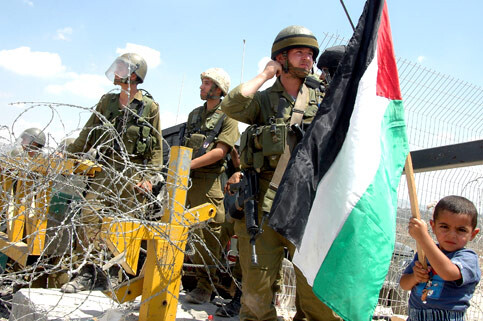The Electronic Intifada 6 September 2007

A Palestinian child a flag near a group of Israeli soldiers during a demonstration against the construction of the wall in the West Bank village of Bil’in, July 2006. (Mushir Abdelrahman/MaanImages)
On Tuesday, the Israeli high court decided in favor of a petition drawn up by the Palestinian villagers of Bil’in in the occupied West Bank to change the current route of the illegal apartheid wall which encircles the small village. For years, residents of Bil’in, along with international and Israeli activists, have led nonviolent resistance actions every week against the encroaching wall and the illegal settlement colonies that expand on a daily basis on their land. Villagers and activists have been tear-gassed, shot at, arrested, and beaten by Israeli occupation soldiers during direct confrontations against the wall and the continued theft of Bil’in land, but the resistance presence has grown into what organizers and Palestinian leaders call a force to be reckoned with. Dr. Mustafa Barghouthi, Palestinian legislator and secretary-general of Al Mubadara, the Palestinian National Initiative, stated that Tuesday’s court ruling was a direct result of the steadfast resistance movement in Bil’in.
Though the court decision ruled that the illegal apartheid wall should be moved somewhat, there is still a significant amount of village land that will remain on the other side of the wall.
Additionally, the court ruled that dozens of existing buildings in the illegal settlement colony of Modiin Illit should not be demolished despite the fact that the colony sits on Bil’in land, owned by several Palestinian families.
The fact that the illegal wall will be altered in its course is definitely a significant relief to the villagers, the land-owners and the dedicated resistance activists who have stood in defiance of the wall and the soldiers, but is by no means an outright triumph for the movement. The wall is still eating up land at an accelerated rate, and the settlement colonies have been given the green light by the current court ruling to continue the status quo: creating facts on the ground in direct contravention to international law. Settlers still get to keep their illegal, spreading colonies and apartheid matrix systems that slice up the West Bank, as any realization of a so-called “viable Palestinian state” remains an elusive and illogical pipe dream.
Over three years ago, the International Court of Justice ruled that the apartheid wall is illegal and must be dismantled, that Palestinians receive appropriate reparations and that all states that respect the Fourth Geneva Convention are under obligation “not to recognize the illegal situation resulting from the construction of the wall and not to render aid or assistance in maintaining the situation created by such construction.” Yet Israel has outright scoffed at the ruling, and no foreign state has come forward to denounce Israel’s practices of apartheid and land theft as mandated by the ICJ decision.
What happened in Bil’in is certainly a step forward, following in the path of several villages that have stood firm against the increasing colonization of their land. Budrus, a small village near Bili’in, won a court battle that pushed the route of the apartheid wall back to the so-called “Israeli” side of the invisible green line — marking the internationally recognized boundary between Israel and the West Bank — nearly two years ago, but received little attention in the media. And community leaders inside Budrus were not quick to claim total victory; the wall still looms on the horizon and continues to make life completely impossible for their neighbors.
Activists involved in the struggle for Bil’in know that the fight is not close to being over. According to Yonatan Pollack of Anarchists Against the Wall, Bili’in “is a symbol of resistance — ultimately, the people have power over Israeli institutions and interests. The fact that the court ruled in favor against the wall is not because it is fond of human rights, but because it was forced to do so by a powerful lawyer and a popular uprising. It is important to remember that the court decision is still in deviation from international law; it still approves building the wall and promoting the illegal policy of segregation. The struggle does not end with this court ruling. [And] it is going to take a long time before the army proposes a new route, gets it approved by the court … and the new route is implemented and the old wall dismantled.”
Pollack says that the larger context is important to keep in mind while looking at the situation in Bil’in. “The overall picture is that of Israeli annexation of land and strategic control over the Palestinian population. The most important thing people can do in the international arena is to support the boycott, divestment and sanctions movement, which is the most powerful tool of international resistance.”
As Israel clamps down in the West Bank, East Jerusalem and Gaza, backed and fortified by US and EU allies in its military-industrial colonization project, villagers and activists across occupied Palestine are hoping that these small sparks of resistance actions will grow and multiply as the occupation intensifies. Pollack agrees, saying, “We hope that this ruling in Bil’in will help fuel other villages to fight the wall and resist the overall occupation.”
Nora Barrows-Friedman is the Senior Producer and co-host of Flashpoints on Pacifica Radio and travels several times a year to occupied Palestine to document the situation. She is also a freelance reporter for Inter Press Service. She can be reached at norabf AT gmail DOT com. Her website is www.norabf.com.
Related Links
- A village mobilized: Lessons from Budrus, Ida Audeh (13 June 2007)
- BY TOPIC: Israel’s Apartheid Wall



